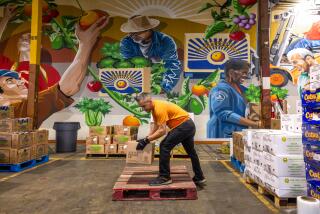Record Food Stocks Worldwide Turn Into Bitter Harvests as World Hunger Grows
- Share via
ROME — Although the world now has 5 billion people to feed, and many Africans and Latin Americans are going hungry, record food stocks are piling up at an alarming rate.
Farmers produce so much grain, beef and butter that food-limitation talks among Western nations are beginning to take on the importance, and intransigence, of arms negotiations.
Two themes at cross purposes provoke growing concern at the U.N. World Food Council (WFC), a Rome-based group charged with watching over the world’s pantry:
-- U.S. and European Common Market officials are trying without success, in heated debate, to share export markets and set prices that do not incite their farmers to protest.
-- African nations complain that their vital goal of food security is as elusive as ever, despite fresh rains in dry areas and mounting international attention to their plight.
‘Biological Revolution’
“We are in the middle of some kind of biological revolution,” said Maurice Williams, the departing World Food Council executive director. “There must be a major structural adjustment.”
Williams said technological advances, combined with state support for farmers, threatened to overwhelm producers with food they can neither eat nor sell. He said he sees no end in sight.
By the year’s end, the WFC expects surplus cereal stocks to reach 370 million tons, 60 million more than in 1985, along with mountains of meat, dairy products and other staples.
Production rates were forecast to rise in nearly every part of the world, including Africa.
Economic Tangle
The problem is not agricultural but economic.
Many people face severe hunger because they cannot afford to buy food that they cannot produce themselves. Producers cannot give away their surpluses without destroying local incentives.
Some African countries, finally producing grain surpluses after years of drought, cannot compete with subsidized Western grain.
With no outlets, their grain will rot and they will have difficulty convincing their farmers to grow more.
Help Is Limited
As a good-will gesture, Western governments are paying some local costs to move surplus African grain to deficit areas elsewhere on the continent. But their help is limited.
Western governments with food surpluses are open to criticism at home for spending money to move grains around Africa when they have too much of their own in stockpiles.
U.S. officials argue that the Common Market has crowded American farmers out of their traditional world market share. They want food exports to be negotiated as part of the General Agreement on Tariff and Trade.
The Common Market argues the whole world market has declined since some traditional importers now produce surpluses, and that U.S. export subsidies drive down world prices at the expense of European farmers.
‘Can’t Afford Subsidies’
The U.S.-European dispute threatens to freeze out smaller food exporters caught in the middle.
“Africans are suffering from this, and so are we,” said Anthony Gleeson, an Australian official. “We can’t afford subsidies--70% of our production is for export.”
Gleeson said he feared that the entire food trading system would have to suffer an abrupt shock before more normal balances could be restored.
Williams agreed, adding: “I don’t see anything happening anytime soon. I’m afraid everyone is in a mood to fight this thing out.”
‘Multidimensional Problem’
At a recent WFC conference, M.S. Swaminathan, a leading expert in agricultural development, urged industrialized governments to protect farmland rather than produce excess food.
More to Read
Sign up for Essential California
The most important California stories and recommendations in your inbox every morning.
You may occasionally receive promotional content from the Los Angeles Times.










